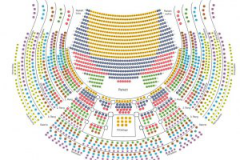Elektra
March 2026 | ||||||
|---|---|---|---|---|---|---|
Mo | Tu | We | Th | Fr | Sa | Su |
Tragedy in one act (1909)
recommended for 16 years and older
In German. Without surtitles due to the stage design. Premiere 27.10.1997.
Duration est. 1 hours 50 minutes
Premiere of Richard Strauss' "Elektra" on October 27, 1997 in the Nationaltheater
Elektra's father: murdered. Her mother and her paramour Ägisth were his murderers. The disheveled Elektra is determined to avenge the parricide. She has the axe for the deed but not the strength. Then her brother Orest appears … Armor-plated emotions! – whipped up by a gigantic orchestra. An aristocratic cast of singers. An enthusiastically cheered staging by Herbert Wernicke. A shattering drama of the Soul.
Synopsis
On his return from the Trojan War, King Agamemnon was murdered by his wife, Clytemnestra, and her lover, Aegisthus. Electra, the daughter of Agamemnon and Clytemnestra, wishes to avenge her murdered father. She is awaiting the return of her brother, Orestes, who was removed from the court as a child after the murder of his father.
The maids taunt and jeer at Electra, who is forced to live as an outcast before the palace gates. The only one to remain loyal to her is the youngest of the maids, who is abused by the others as a result. Electra invokes the ghost of her dead father and conjures up the image of his murder before her mind’s eye. She has a vision of the day on which she and Orestes will have their bloody revenge.
Her sister, Chrysothemis, warns Electra that their mother, Clytemnestra, is planning to have her locked up. Chrysothemis, who longs passionately for love and a life of fulfilment, is afraid that she might meet with a similar fate. She blames her sister for the situation in which they both find themselves. Clytemnestra is tortured by nightmares in which Orestes appears to avenge his father. She approaches her daughter, hoping that Electra will say something to stop her having these dreams. She does not, however, understand what Electra means when the latter tells her that she will no longer be plagued by these nightmares once the right person has been killed by the axe. Just as Electra, overcome by hate, flings her plans for revenge in her mother’s face, the Queen receives the news of Orestes' death. She laughs at her daughter scornfully and disappears into the palace.
Electra is now determined to carry out her plan for revenge on Clytemnestra and Aegisthus with the sole help of Chrysothemis. But Chrysothemis refuses to become involved.
A stranger now appears, claiming that he is the messenger who has come to inform the court of Orestes’ death. When Electra curses the messenger and announces who she is, the messenger reveals himself as Orestes. He has come to avenge their father. Before Electra can hand him the axe with which Agamemnon was slain and which she has kept for Orestes, he is called into the palace to appear before the Queen. The Queen’s scream, as she dies, release Electra from her suspense.
Aegisthus now returns. Electra greets him with feigned friendliness, confirms the news of Orestes’ death and accompanies Aegisthus into the palace, where Orestes awaits him.
In her joy at the vengeance which has been wreaked, Electra is hardly aware of Chrysothemis when the latter comes to tell her that Orestes has arrived and has killed Clytemnestra and Aegisthus.
Program and cast
Conductor: Vladimir Jurowski
Director: Herbert Wernicke
Chorus: Christoph Heil
Klytämnestra: Nina Stemme
Elektra: Christine Goerke
Chrysothemis: Vida Miknevičiūtė
Aegisth: Charles Workman
Orest: Iain Paterson
Der Pfleger des Orest: Bálint Szabó
Die Vertraute: Meg Brilleslyper
Die Schleppträgerin: Elene Gvritishvili
Ein junger Diener: Tansel Akzeybek
Ein alter Diener: Martin Snell
Die Aufseherin: Katja Pieweck
Erste Magd: Noa Beinart
Dritte Magd: Emily Sierra
Vierte Magd: Erika Baikoff
Fünfte Magd: Eliza Boom
Bayerisches Staatsorchester
Chorus of the Bayerische Staatsoper
National Theatre Munich
The National Theatre Munich (German: Nationaltheater München) is an opera house in Max-Joseph-Platz in Munich, Germany. It is the home of the Bavarian State Opera and the Bayerisches Staatsballett(Bavarian State Ballet).
The Bavarian State Opera also performs in the Prinzregententheater, which opened in 1901 and, like the Bayreuth Festspielhaus, is built to Richard Wagner's specifications, and in the Cuvilliés Theatre at the Residenz, constructed in 1751–1753 and described by Thierry Beauvert as "a Rococo gem".
The Nationaltheater is very easy to get to both by car and by MVV public transportation.
By MVV public transportation
S-Bahn: S 1 - 8 Marienplatz
U-Bahn: U 3, 6 Marienplatz, U 3 - 6 Odeonsplatz
Bus: 52, 131 Marienplatz, 100 Odeonsplatz
Straßenbahn: 19 Nationaltheater
On the day of the performance, holders of regular tickets are entitled to use public transport provided by the Münchner Verkehrsverbund (MVV). This service starts at 3 pm respectively three hours before the performance commences and ends with the closing hour of the MVV.
By Car
Take the Altstadt-Ring to Maximilianstraße.
Parking garage Max-Joseph-Platz: open Monday to Sunday from 6:00 A.M. to 2:00 A.M.
You can take advantage of the special theatre parking fee of Euro 10,- from 6:00 P.M. to 8:00 A.M. by presenting your admission tickets.

 EN
EN DE
DE IT
IT FR
FR ES
ES RU
RU JP
JP RO
RO
 Seating plan
Seating plan 